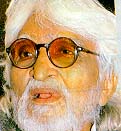Commentary / Vir Sanghvi
The Husain controversy is a campaign that demeans every Hindu
 Hinduism is more complex. In the
1940s, a section of India's Muslims chose the Muslim League and eventually, the Islamic state of Pakistan.
The Hindus stuck with the Congress which promised a secular state
in which Hindus and Muslims would be equal.
Hinduism is more complex. In the
1940s, a section of India's Muslims chose the Muslim League and eventually, the Islamic state of Pakistan.
The Hindus stuck with the Congress which promised a secular state
in which Hindus and Muslims would be equal.
This has been a matter of lasting regret for the BJP. As a Hindu
party it should always be in power in a country where Hindus are
in a majority. But Hindus vote as Indians, not as Hindus. Some
of us may vote for the BJP, others may not; it is not, in any
sense, the natural party of government.
As politically incorrect as this may sound, there is no doubt
that many Hindus reacted to The Satanic Verses agitation
by saying, 'Oh god! Those fanatical Muslims are at it again.'
The patronising response was occasioned by the certainty that
Hindus would never behave in this manner.
Similarly, when Ayatollah Khomeini issued his fatwa against
Salman Rushdie or when Taslima Nasreen had to flee Bangladesh,
Hindus clucked their tongues superiorly. In India, they said,
Hindus would never use the power of the state to impose religious
judgement on other people.
Well, think again!
The single-biggest miscalculation by the BJP over the last decade
has been its belief that everybody who regarded the Babri Masjid
as a symbol of pseudo-secularism or minority appeasement would
rejoice when it was pulled down.
In fact, Hindus reacted with revulsion, shame and horror. The
destruction of other people's idols or places of worship has never
been part of the Hindu tradition. There are no crusades in our
history; no kings who want to be known as Mahmud the Idol Breaker.
By demolishing the Babri Masjid, the BJP demonstrated how removed
its understanding of Hinduism was from the reality. And it has
taken the party years to recover.
The Shiv Sena and the Sangh Parivar are now repeating that
mistake. First of all, Hindus are not offended by the nation that
their gods and goddesses might sometimes be portrayed nude and
there are centuries of temple art to prove it.
Secondly, it is against every principle of religious tolerance
to persecute a man for a work of artistic merit that he has produced
in response to a creative impulse. Muslims used as justification,
Rushdie's statement that he was trying to shock. Husain has never
tried to give religious offence.
Thirdly, the Rushdie and Nasreen affairs were seen by Muslims
as intra-Islam matters. It wasn't much of a defence but the persecutors
did nevertheless claim that they were acting within their own
community. They were not forcing Hindus to accept some standard
of Islamic correctness.
Even this defence is not available to the Shiv Sena. They are
using an alleged offence to Hindu sensibilities to persecute a
Muslim. What could be more medieval?
 And finally, the confusion between religion and the state is something
that all Hindus are unhappy about. When we opted for a secular
polity in 1947, we did not desire a situation in which some khaki-knickered
buffoon misused the power of the state to persecute non-Hindus
in the name of our religion.
And finally, the confusion between religion and the state is something
that all Hindus are unhappy about. When we opted for a secular
polity in 1947, we did not desire a situation in which some khaki-knickered
buffoon misused the power of the state to persecute non-Hindus
in the name of our religion.
So, forget about all the liberal arguments. Of course, the campaign
against Husain goes against the principles of freedom of expression,
etc. But that's self-evident.
The real problem is that it also goes against the principles of
Hinduism. It is a campaign that tramples over thousands of years
of tradition. And it is a campaign that makes every Hindu feel
small and demeaned.
|





 Hinduism is more complex. In the
1940s, a section of India's Muslims chose the Muslim League and eventually, the Islamic state of Pakistan.
The Hindus stuck with the Congress which promised a secular state
in which Hindus and Muslims would be equal.
Hinduism is more complex. In the
1940s, a section of India's Muslims chose the Muslim League and eventually, the Islamic state of Pakistan.
The Hindus stuck with the Congress which promised a secular state
in which Hindus and Muslims would be equal.
 And finally, the confusion between religion and the state is something
that all Hindus are unhappy about. When we opted for a secular
polity in 1947, we did not desire a situation in which some khaki-knickered
buffoon misused the power of the state to persecute non-Hindus
in the name of our religion.
And finally, the confusion between religion and the state is something
that all Hindus are unhappy about. When we opted for a secular
polity in 1947, we did not desire a situation in which some khaki-knickered
buffoon misused the power of the state to persecute non-Hindus
in the name of our religion.